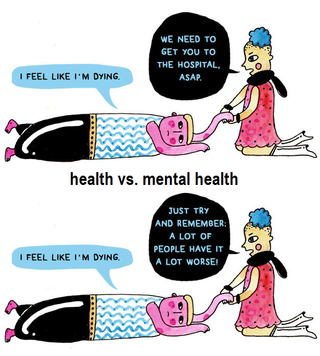Depression
7 Reasons Why Breast Cancer Is Better Than Depression
My reflection as a survivor of two very different health diagnoses
Posted August 3, 2016
I invited Ms. Nancy Alterman, LCSW to write this week's blog. Ms. Alterman is a geriatric social worker and clinical instructor at Rowan University.

The day after my first chemotherapy treatment, I had an epiphany. I was overcome with relief. I was going to be sick and not feel ashamed. Tears filled my eyes as I thought about how different having breast cancer was going to be from the experience I had eight years earlier when I developed a major clinical depression.
Now, after 4 courses of chemotherapy and 35 radiation treatments, I’m on my way to recovery from breast cancer.
Here are 7 reasons why breast cancer is better than depression:
- I didn’t suffer in silence and wasn’t alone with breast cancer. People eagerly helped me at every turn. Friends cooked meals, drove me to doctor appointments, and cleaned my house. Dozens of others who have been down this road offered to help me again and again. When I suffered from depression, I felt alone. Even my boyfriend who knew I was suffering and had also been in therapy for depression could not help me. I kept hoping that I’d wake up each morning and be myself again. I had no idea what I needed to do to get well. I was lost and alone. I couldn’t function.
- I wasn’t ashamed about having breast cancer. Having depression made me feel that I’d let down my loved ones. Well-meaning friends encouraged me to cheer up, as though my sickness was an option. “You’ll get over it,” they said. No one understood what had happened to me. I felt judged. I was trapped inside a very sick body. My speech was flat. I’d become so small inside that I could barely find me anymore. I dragged around a dead weight called my body. Then, when I tried to end my life, I was forced to appear in court. I’ll never be given a court summons because of breast cancer. And, when I told people I had breast cancer, they said, “Oh my God – how scary!”
- Cancer didn’t threaten my professional occupation. No one questioned my ability to do my job with the news of my cancer diagnosis. Depression lives in the brain. When I attempted suicide, people told me not to tell my employer as it would reflect poorly on my record and leave me vulnerable to losing my job. Long after I returned to work, I didn’t talk about the reason for my absence. With cancer, there was no need to keep my health a secret. I was reassured I can take off as much time as I need to deal with the cancer treatments and the process of healing. My co-workers have been very understanding and have given me ongoing support, enabling me to work while receiving treatments.
- Many reputable and nationally known health care providers eagerly sought me as a customer. When I had depression, finding good resources was nearly impossible. Even as a licensed social worker, I was not prepared for getting sick or understanding how stuck I was going to be with receiving the treatments I needed. My family struggled to find care providers, yet they didn’t get the right guidance. There were no commercials on television or radio spots announcing the best place for helping patients after a suicide attempt. My sister made many phone calls before she found a competent psychiatrist who had availability to see me. No providers took insurance. The cost of the first visit was $225. Even my family doctor didn’t know how to help me. He started me on an antidepressant, but had neither the training to care for me nor the connections in the community to get me the care I needed. With cancer, it’s different. Cancer screenings and referrals are routine. I will be seen by an oncologist for the rest of my life, and the visits will be 100 % covered by insurance.
- There is solid science and good public information about breast cancer. There are public service announcements, newspaper articles, and television programs, all warning people about cancer threats. Not so with mood disorders. While the effect to integrate behavioral health into primary care is slowly taking place, most family doctors still do not have clear guidance for diagnosing and treating mood disorders. They get most of their information from drug representatives. The science behind many of the medications is not well understood, especially in selecting one that will likely work for a specific individual. There are not enough highly skilled psychiatrists and therapists aggressively treating depression and other mental illnesses.
- My pain and suffering with breast cancer was intermittent. My pain, immobility, agony, and suffering with clinical depression were constant. There was no real reprieve from the disability from my depression. When I was depressed, I was helpless and impaired. I couldn’t manage day-to-day task. With cancer, my physical discomfort and, even my emotional suffering, came and went. My sadness fluctuated appropriately. With depression, every moment awake took an effort to be alive.
- The survival rate is better for cancer than clinical depression.About 40,450 women in the U.S. died in 2015 from breast cancer,* though death rates have been decreasing since 1989. Women under 50 have experienced larger decreases. These decreases are the result of treatment advances, earlier detection through screening, and increased awareness. Contrast these survival rates with those for mental illness. 90% of all people who die by suicide have a diagnosable mental illness prior to their death. In 2014, there were 42,773 suicide deaths.
Being treated for breast cancer wasn’t a day at the beach. Often I was weary. Sometimes I was in pain. Almost daily, my stomach was upset. But I never lost my sense of humor or my ability to spend good-natured time with my family or friends. I remained capable of making decisions about my health care because I could absorb the information provided and often was motivated to research more.
I will live with both breast cancer and depression for years. I’ll be vigilant about monitoring myself for potential relapses and will continue to take my medications as prescribed.
But yes, having breast cancer was better than having a major clinical depression.
*The American Cancer Society Cancer Facts & Figures 2014
*Image used with permission from Haejin Park for Buzzfeed


